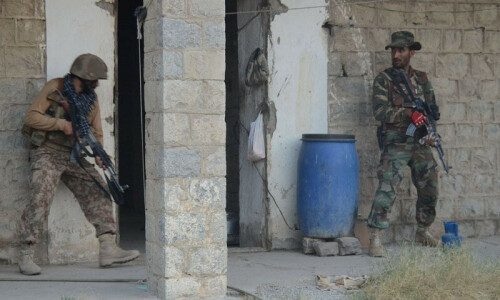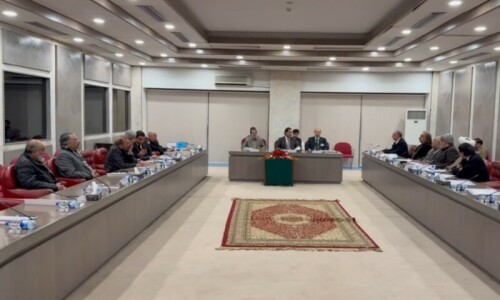ISLAMABAD: Foreign Minister Shah Mehmood Qureshi believes that economic security is sine qua non for having an independent foreign policy.
“In countries that are drowned in debt and go around with a begging bowl, an independent foreign policy cannot be a reality,” he said while speaking at an event titled ‘Vision FO’ here on Monday.
“Our primary focus has been on security since Pakistan came into being, and we are in a much better place in that area, but our vulnerability is economic security,” he said,
The foreign minister said Pakistan would remain subject to the International Monetary Fund’s “conditionalities” or be forced to seek help from other countries until it became independent economically.
He said the Economic Diplomacy Wing at the Foreign Office was being overhauled in order to improve Pakistan’s economic outreach.
He defended the government’s foreign policy performance under his watch, saying that the world was no longer “blindly” buying the Indian narrative due to Islamabad’s successful efforts to counter negative perceptions.
He said a Strategic Communications Division was set up at the Foreign Office to carry out narrative building to fight the “global battle of perception”.
Says world no longer buying India’s narrative on Kashmir
Citing an example to highlight the importance of building a narrative, he said India had “cleverly and cunningly” given Kashmiris’ efforts for their right to self-determination the colour of terroism. As a result of this narrative, he said, innocent Kashmiris were being blamed for terrorism even though they were being oppressed.
“Unless we counter this narrative, our international image cannot be corrected. And you saw that through narrative building, Pakistan achieved success,” he noted.
Mr Qureshi said Pakistan had been able to convince the world that it had lost 70,000 lives to terrorism and thus it didn’t merit being accused of sponsoring terrorism.
“Today the international press is not buying the Indian narrative blindly. They question [instead],” he said, adding that this “doubt” was created due to Pakistan’s counter-narrative.
The minister also said Pakistan was previously perceived as the “problem” for every roadblock in Afghanistan.
He said the world today was “recognising Pakistan’s role” in the Afghan peace process and observed that although Afghan peacemaker Abdullah Abdullah was “never very soft” on Pakistan in the past, his tone during his recent visit to Islamabad was also “very different”.
“The United States’ narrative [regarding Pakistan], at least on Afghanistan, is also very different today,” he added.
Mr Qureshi said the FO had reached the conclusion that if it were to cope with the 21st century diplomatic challenges, its “toolkit” would need to be updated, and for this, measures were being taken to improve communications, coordination with various departments and specialisation at the foreign ministry.
He said in order for Pakistan to successfully fight international arbitration cases, the FO’s legal division was being strengthened through recruitment on vacant posts and efforts were being made to increase its interaction with the law ministry.
A Kashmir cell that works continuously has also been established at the FO and it receives the input of other institutions as well. The cell works to “counter the Indian propaganda” that New Delhi’s August 5, 2019, move to revoke India-held Kashmir’s semi-autonomous status was aimed at bringing prosperity to the region’s residents, according to the foreign minister.
“The international press is now more critical [of India] ... due to the narrative built by Pakistan,” he said.
Mr Qureshi further said a 24/7 crisis management centre was set up at the FO, describing it as a “permanent feature” where deputed and designated officers deal with unforeseen situations. The centre helped in bringing home nearly 250,000 Pakistanis who were stranded abroad due to the coronavirus pandemic.
He said the Foreign Services Academy was shifted to a new campus with better facilities and its curriculum was updated keeping in view modern diplomatic needs.
Steps were also being taken to use the Institute of Strategic Studies as the research arm of the FO, while the Institute of Regional Studies is being upgraded after its takeover by the FO, the minister said.
According to Mr Qureshi, an advisory council on foreign affairs was set up where experienced professionals from the academia and private sector gave their input on foreign policy issues.
He also mentioned other initiatives such as ‘FM Connect’, a forum to engage with different stakeholders, and the ‘FM Direct’ app through which FO officers can quickly communicate thoughts and ideas.
“The FO is also increasingly relying on virtual interactions to connect with foreign missions”, Mr Qureshi said.
Published in Dawn, October 13th, 2020













































Dear visitor, the comments section is undergoing an overhaul and will return soon.